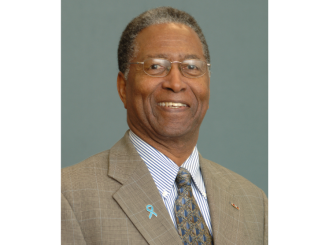Apr 11, 2023
Col. Williams Will Receive a Patient Advocate Award at the 2023 ASCO Annual Meeting
By Geraldine Carroll
Colonel (Ret.) James E. Williams, Jr., has been honored with a Patient Advocate Award for his exceptional leadership in prostate cancer advocacy on behalf of patients and their families. The award also acknowledges his tireless efforts to narrow the gap in cancer care disparities among Black men.
“I’m honored to receive this award from ASCO and deeply appreciate the organization’s role in accelerating cancer research and promoting quality and equitable care,” Col. Williams said. He will receive the award during the 2023 ASCO Annual Meeting and participate in a roundtable discussion with ASCO’s Special Award recipients on mentorship and career development on June 4.
Col. Williams’ journey to advocacy began with his own experience with prostate cancer, which he described as “a perfect storm.” At the insistence of his wife in 1991, Col. Williams went for a routine physical and had an unusually high prostate-specific antigen level. He received further tests and was diagnosed with prostate cancer.
“My wife saved my life because she insisted that I go to see our primary care physician,” he said. “I had no symptoms but the screening tool, the prostate-specific antigen, detected a problem.”
Col. Williams’ swift access to screening followed by treatment at the Mayo Clinic were crucial to his survival. The experience motivated him to dedicate his time to improving prostate cancer awareness, education, and access to care, and more broadly, to improving men’s health.
“I felt that my experience should be the standard in America, but my experience was the exception and not the rule,” Col. Williams said. “So, I got involved in advocacy to see why we did not have this standard, and then discovered that one of the major problems is health policy.”
Col. Williams has worked to improve legislation pertaining to screening and to reduce other barriers in communities of color.
“Men don’t talk to their sons about the importance of annual examinations,” he said. “When I talk to men about screening and the importance of annual examinations, they don’t see the merit of that because it’s not in their mindset.”
However, Col. Williams explained, when men are made aware of prostate-related symptoms, such as frequent urination, trouble urinating, fatigue, and abdominal and back pain, and the impact on their quality of life, they begin to realize that they may have an issue with their prostate and need to prioritize screenings and prostate health. “When I start talking about their quality of life, they soon see the connection between their poor quality of life and their prostate,” he said.
Col. Williams has been associated with 20 organizations over the past three decades that work to increase screening, access to care, and representation in clinical trials. He has served on many national and statewide cancer boards and is the chairman of the Pennsylvania Prostate Cancer Coalition’s Board of Directors. He is past chair of the Intercultural Cancer Council, which promotes policies, programs, partnerships, and research to eliminate the unequal burden of cancer among racial and ethnic minorities and medically underserved populations. He has also participated as a member of the Editorial Advisory Board of the American Association for Cancer Research.
“Black men are underrepresented in clinical trials,” Col. Williams said. “They are disproportionately affected by prostate cancer and experience longer delays between diagnosis and treatment.”
As a member of the Patient Advocacy Committee of the Alliance for Clinical Trials in Oncology and board member of the Alliance for Prostate Cancer Prevention, he has advocated for cancer research to be accessible at venues beyond large academic institutions.
Col. Williams has taken his message about men’s health to barbershops, churches, community centers, schools, social events, and beyond because he believes that reversing the disproportionate number of Black men impacted by prostate cancer requires advocacy on the ground where men work, live, and socialize. These days, Col. Williams is involved in at least one advocacy event a week and leads a consulting firm specializing in prostate cancer awareness, education, and advocacy.
The many skills that Col. Williams has developed over the course of multiple careers, including in the military and as a human resources professional in the corporate and nonprofit sectors, have served him well as a leader in cancer advocacy. At the core of his approach is a steadfast belief that every person on a team is critical to the mission—a lesson he first learned from two tours in the Vietnam War and one that equally applies to the role of an exceptional leader in cancer advocacy.
The ASCO Patient Advocate Award is given to individuals whose contributions have had an exceptional impact on public awareness about cancer, its causes, cures or treatment, and activities that result in additional legislative or fiscal support for cancer research, treatment, prevention, or care.

